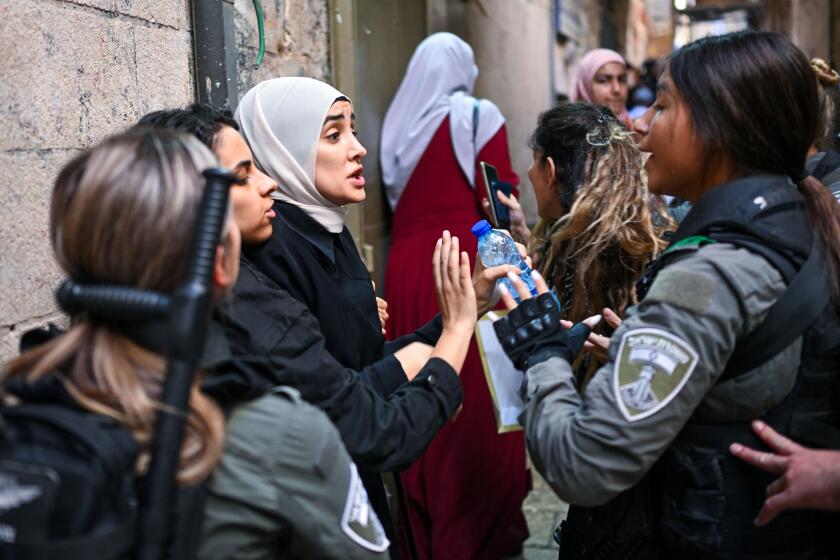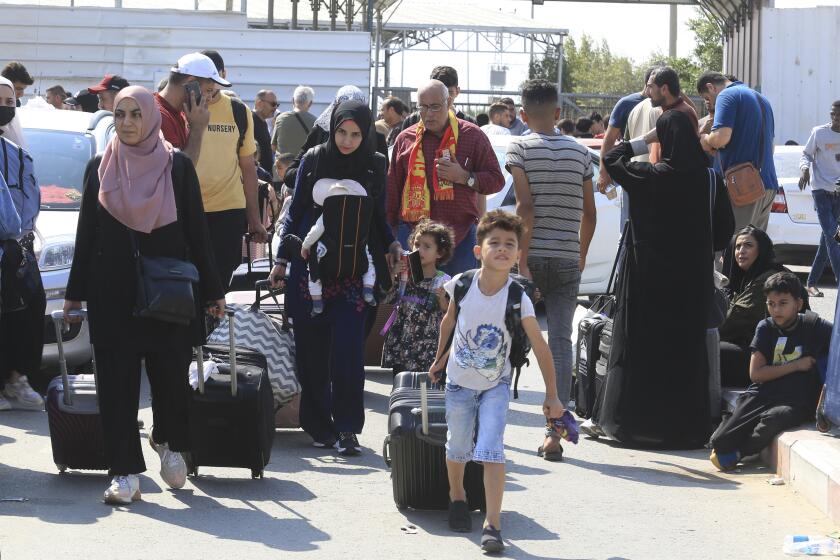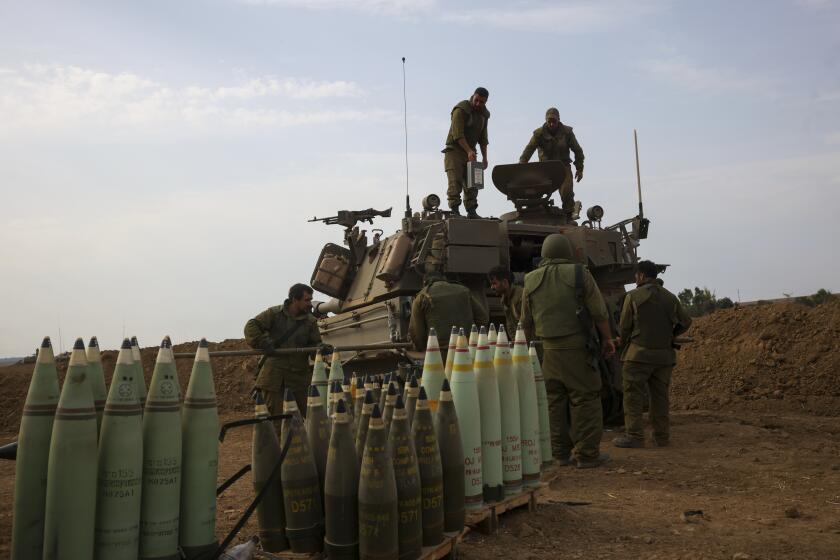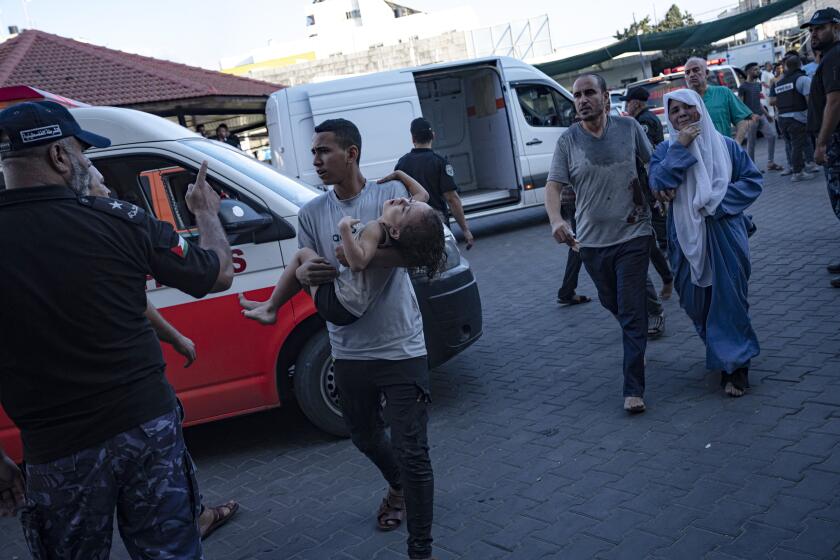More than 1,000 sign open letter decrying cancellation of German event for Palestinian author
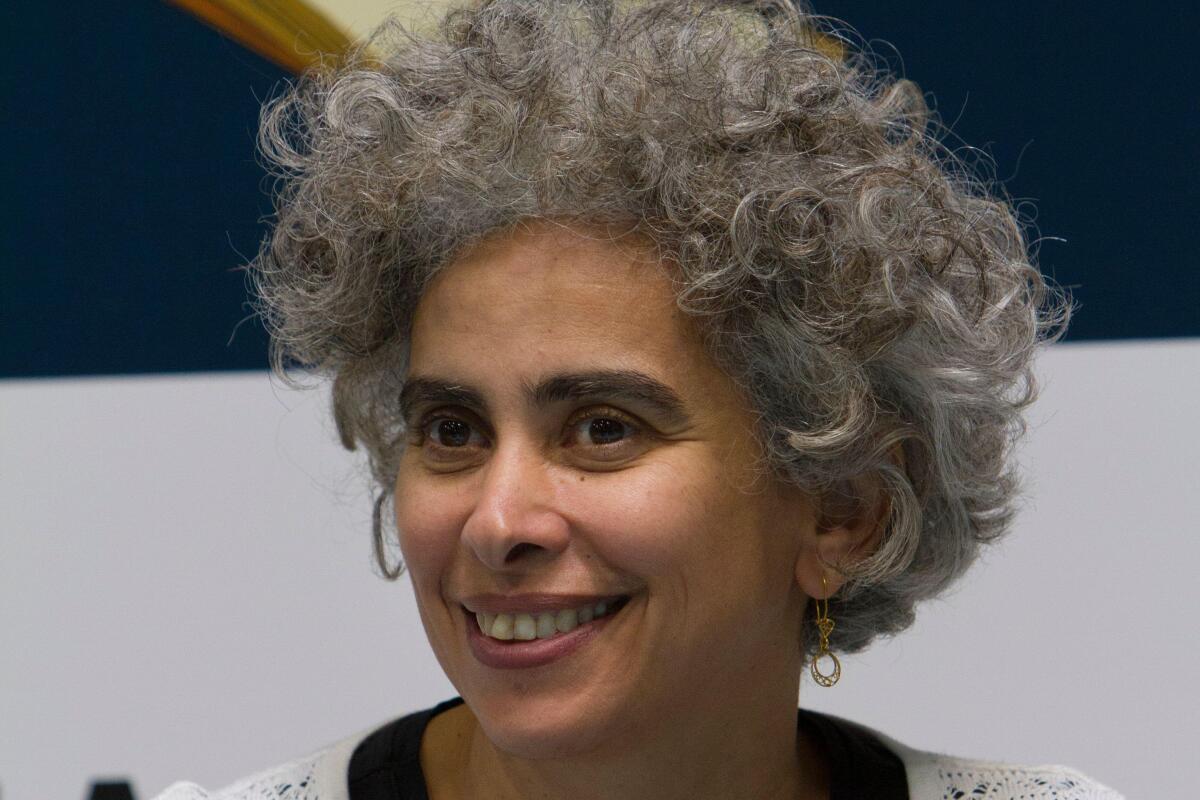
- Share via
An open letter released Monday morning and signed by more than 1,000 writers and publishers decried the decision of literary association Litprom to cancel a celebration for an award-winning Palestinian author at the Frankfurt Book Fair in the aftermath of the Oct. 7 attack by Hamas on Israeli citizens. The letter also asked that the fair — one of the largest publishing conventions in the world, which runs Wednesday through Sunday — reinstate events surrounding Adania Shibli.
“While Shibli’s ‘Minor Detail’ has been smeared as being anti-Semitic by two journalists and literary editors, other serious literary critics have clearly refuted this in the German press and elsewhere,” reads the letter, whose signatories include Wallace Shawn, Colm Tóibín, Eileen Myles, Hari Kunzru, Sapphire, Rachel Kushner and hundreds of other writers and publishers. “The book makes reference to well-documented events related to the rape of a Bedouin girl in 1949 by an Israeli army unit.”
Originally published in 2017, the novel’s English translation three years later earned nominations for a National Book Award and an International Booker Prize. And upon its translation in 2022 into German, it was awarded the 2023 LiBeraturpreis, an annual prize for work by women authors across Asia, Africa and Latin America. Winners are presented with the award each year at the Frankfurt Book Fair.
As the Jewish Sabbath fell and Muslims marked their principal prayer day, Israelis and Palestinians struggled with the terrifying new reality after the militant group Hamas’ deadly attack on Israel.
But on Friday, Litprom, the organization that distributes the book award, changed course. A panel featuring Shibli and her German-language translator, Günther Orth, was canceled.
Litprom, which is partly funded by the German government and the Frankfurt Book Fair, explained its decision not to present Shibli with the honor in an online statement.
“Due to the war started by Hamas, under which millions of people in Israel and Palestine are suffering, the organiser Litprom e.V. decided to not hold the award ceremony of the LiBeraturpreis at the Frankfurt Book Fair,” the statement read. “Litprom is looking for a suitable format and setting for the event at a later point.”
Palestinian families in cars, trucks and donkey carts crowded the main road out of Gaza City as Israeli airstrikes continued to hammer the territory.
The letter asks the organization and the fair to reconsider their decision. “The Frankfurt Book Fair has a responsibility, as a major international book fair, to be creating spaces for Palestinian writers to share their thoughts, feelings, reflections on literature through these terrible, cruel times, not shutting them down.”
It additionally notes that a piece that ran Friday in the New York Times erroneously reported that the cancellation was a “joint decision” made with Shibli. In fact she did not agree with the decision, and the error was corrected. Litprom, which had originally implied Shibli’s consent in its release, also corrected its statement.
Barbara Epler, the head of New Directions, the American publisher of “Minor Detail,” wrote a letter to the editor, excerpted in Monday’s open letter, demanding the correction.
“Awarding the prize to Adania Shibli was never in question,” a spokesperson for Litprom said in a statement. “Litprom firmly rejects the accusations and defamations made against the author and the novel in parts of the press as unfounded. We were in communication with the author and her German publisher during the process of this decision.”
Israel battled Hamas infiltrators for a third day and massed tens of thousands of troops near the Gaza Strip after the biggest attack in decades on Israeli soil.
Jacques Testard, head of Shibli’s U.K. publisher, Fitzcarraldo Editions, invoked the broader context of literature in the open letter. “One of the purposes of literature is to encourage understanding and dialogue between cultures,” he said in the open letter. “At a time of such horrific violence and heartbreak, the world’s biggest book fair has a duty to champion literary voices from Palestine and Israel. We stand in solidarity with Adania Shibli and her German publishers, Berenberg Verlag.”
As part of its reckoning with the Holocaust, Germany has instituted strict penal codes and rules against expressions of antisemitism. But more recently, its relationship with Israel has come into question. One specific concern is that groups associated with the Boycott, Divestment and Sanctions movement against Israel (also known as BDS) might be punished. In 2019, the German parliament (Bundestag) designated BDS as a group that uses antisemitic tactics to achieve its political goals.
BDS identifies as a Palestinian-led movement for freedom, justice and equality.
“BDS upholds the simple principle that Palestinians are entitled to the same rights as the rest of humanity,” the organization says on its website. “Israel is occupying and colonizing Palestinian land, discriminating against Palestinian citizens of Israel and denying Palestinian refugees the right to return to their homes. Inspired by the South African anti-apartheid movement, the BDS call urges action to pressure Israel to comply with international law.”
Medics in the besieged enclave said they ran out of places to put remains pulled from the Israeli strikes or recovered from demolished buildings.
The text of the letter follows. A full list of signatories can be found online at ArabLit, the site of the literary quarterly that launched the letter:
…
The shocking and tragic events that began on October 7th and are ongoing today have had repercussions all over the globe, including within the publishing world. Award-winning Palestinian author Adania Shibli, who was a finalist for the 2020 National Book Award for her book Minor Detail (New Directions/Fitzcarraldo, translated by Elisabeth Jaquette), was to receive Germany’s 2023 LiBeraturpreis for the same book, published in German as Eine Nebensache (Berenberg Verlag, translated by Günther Orth) at the 2023 Frankfurt Book Fair, which begins next week.
On October 13, the organizers of the prize, Litprom, which is funded in part by the German government and the Frankfurt Book Fair, released a statement saying Shibli would no longer receive the prize during the book fair.
In addition, a public discussion with Adania Shibli and her translator Günther Orth at the book fair has also been canceled.
The statement originally said that this decision had been made in accordance with the author, which was then relayed, without verification, by an article in The New York Times (now corrected). This is untrue; Adania Shibli has said the decision was not made with her, she was presented with the decision. If the ceremony were held, she said, she would have taken the opportunity to reflect on the role of literature in these cruel and painful times. (Litprom and The Times have since made corrections.)
Shibli’s US publisher, Barbara Epler of New Directions, wrote a letter to the editor of The New York Times, which we excerpt here:
With the unbelievable heartbreak that is now being suffered on all sides, it serves no one to put forward falsehoods, especially about the author of a novel about the Nakba that is so historically true.
To cancel the ceremony and so try to silence the voice of Adania Shibli — “due to the war in Israel” — is cowardly.
But to say Shibli agreed (amid all the suffering in Gaza) is worse.
At a time when the fair has issued a statement saying it wants to make Israeli voices “especially visible at the fair,” they are closing out the space for a Palestinian voice.
While Shibli’s Minor Detail has been smeared as being anti-Semitic by two journalists and literary editors, other serious literary critics have clearly refuted this in the German press and elsewhere. The book makes reference to well-documented events related to the rape of a Bedouin girl in 1949 by an Israeli army unit.
Shibli’s UK publisher, Jacques Testard of Fitzcarraldo writes, “One of the purposes of literature is to encourage understanding and dialogue between cultures. At a time of such horrific violence and heartbreak, the world’s biggest book fair has a duty to champion literary voices from Palestine and Israel. We stand in solidarity with Adania Shibli and her German publishers, Berenberg Verlag.”
In this spirit, those of us involved in writing, translation, and publishing strongly assert that canceling cultural events is not the way forward. We recall the Frankfurt book fair supporting Turkish publishers, and how last year Ukrainian president Zelensky spoke to the fair in a pre-recorded address. The Frankfurt Book Fair has a responsibility, as a major international book fair, to be creating spaces for Palestinian writers to share their thoughts, feelings, reflections on literature through these terrible, cruel times, not shutting them down.
We need to look for new language and new ideas in order to approach these bleak times in a new way. For this, we need writers — including Palestinian writers — more than ever.
More to Read
Sign up for our Book Club newsletter
Get the latest news, events and more from the Los Angeles Times Book Club, and help us get L.A. reading and talking.
You may occasionally receive promotional content from the Los Angeles Times.
